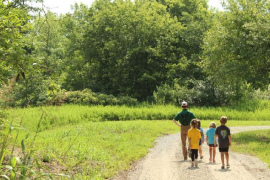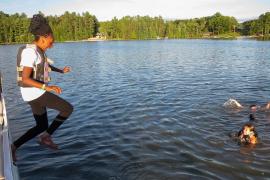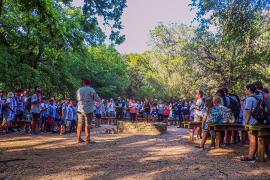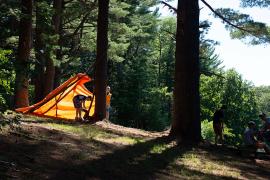My name is Dan Gray, and I am a 21-year-old journalism student in my third year at Ohio University.
I have been camp counseling on and off in different capacities since 2017, most recently as a baseball/lodge counselor at Camp Kawanhee for Boys in Weld, Maine. This piece was written as part of my final assignment for my magazine feature writing class and shared in part here on behalf of Project Real Job, whose purpose is to support camps in their efforts to recruit, hire, and retain staff.
Over the last several years, summer camps across the nation have been facing staffing shortages. With over 26 million campers and families being “impacted” in 2020–21 (up from 10.3 million in 2019) at over 15,000 camps across the country, the trends in staffing have hurt the industry recently, with some camps even having to reduce or cancel their programming during the last couple of summers.
The Effects of the Staffing Shortage
“In the last couple of years, every camp we have spoken to is struggling with staffing,” said Elizabeth “Liz” Standen, co-executive director of the Frank Foundation, which is the administrative entity that runs Camp Kawanhee for Boys. She and her husband, Mark, have shared the role for the last 15 years. Over those years, the Standens have been working hard to extend the reach of their programming. In their first season after taking over as co-executive directors of the Frank Foundation, Kawanhee had somewhere between 55 and 60 employees on staff. This past season, their staffing numbers were up to around 75, which both Mark and Liz say has been “the norm” for several camp seasons now.
The average sleepaway camps have between 41 and 50 seasonal staff members. On top of that, Camp Kawanhee celebrated 100 years of operation in 2022 (one year delay due to the pandemic, the actual 100th year was 2021). The Standens hope to lay the foundations for the next 100 years at Kawanhee; but even though they are ahead of the curve as it pertains to the industry-wide staffing shortage, the camp is starting to feel some of its effects. A couple of lodges were left unfilled during the past couple of summers — “ghost lodges,” as they are known around the camp.
Counselors are noticing it, too. Alex Eaton, a 21-year-old junior special education major at Bowling Green State University in Ohio, was a camper in 2014 and 2015. After taking a several-year hiatus from Kawanhee, as well as patiently waiting for COVID restrictions to be lifted, he returned in 2021 as a lodge counselor and soccer activity counselor. He knows the troubles of feeling short-staffed as a camp employee, as the year he returned was affected by the pandemic.
“We definitely had to have counselors bounce around activities sometimes and help out. You know, if a counselor had to step out, someone would have to step in that was from another activity,” Eaton said when asked about what effects he felt from the camp being short on staff. “Some people would have to cover another person’s activity and they had no idea what they were doing.”
Mark Standen attributed the staff shortage to complexities that resulted from the COVID-19 pandemic. “We felt a little light last summer, and I think a lot of people did,” he said. “I think the explanation for that, in my mind, is that camp has become more complicated. It demands more of the staff, especially in the age of COVID social isolation. And some of the baggage that the kids are bringing to camp, no fault of their own. And so, it calls on the same number of staff, but it depletes them.”
Mark Standen discussed how staff is chosen for each activity, pointing out that the activities that have the highest staffing priority are the ones that are “more dangerous or risky,” like the ropes course and on the waterfront. Getting people who are qualified for those positions happens before any other staffing decisions based on activity are made. “People do step up and cover for each other. That’s always been the spirit, and we don’t take that for granted,” Mark said when the topic of counselor coverage across camp activities came up. “You can be working in athletics and end up lifeguarding on the waterfront. That’s part of the game.”
Staffing Sources
According to Liz, referrals from other counselors have made up the majority of staff who do not come up through their junior counselor and counselor-in-training programs. “We actually don’t like to hire cold. We’re not that comfortable because you don’t know people, and we do run criminal background checks and all that. But that’s only a piece of the story,” Liz said. “If we have a counselor that says, ‘Oh, I know this really great guy,’ that’s the best way we can get a new person. So, that’s why we offer incentives. Pay people to bring new people.” Over the last couple of years, the Standens have been paying a $600 stipend to both any counselor that brings in a new hire as well as the new hire themselves. This has seemed to work well for them in terms of reeling in new staff as well as retaining staff members. This, paired with the fact that Kawanhee’s pre-camp staff training includes lifeguard training courses and first-aid courses from the Red Cross, has allowed them to fill positions and have backup coverage for those positions as well. This also gives staff members a Red Cross certification in situations pertaining to first-aid and lifeguarding, which can be very useful.
Kawanhee has been faring decently well in staffing numbers recently because they have a well-preserved camper-to-counselor pipeline. At summer camps across the country, kids who grew up spending their summers at camp often work as counselors. Many camps rely on this pipeline to fill staff roster spots. This reliance has backfired on the camp industry in recent years, though, especially since the pandemic hit. “And it’s because competition has become steeper. Since Swine 09, camp had a beautiful, organic pipeline of staffing. You had a solid core of returners, and you would hope that a small percentage of them brought a few staff friends,” said Bud Copeland, American Camp Association (ACA), New England’s director of membership and engagement. “When COVID hit and an overwhelming number of camps shut down for the summer, a lot of them broke. That focus from one summer to the next got kind of broken.”
The Competition
Often, though, referrals from returning staff who are offered contracts end up employed elsewhere over that summer. With the core of counseling staff being made up of mostly college-age students, fighting the competition from the many opportunities presented to students for their summer has been becoming more and more of a challenge each year.
“Internships are kind of another thing that comes up specifically for residential camps, because if I’m going to commit my summer — internships don’t get posted until January, February, or March,” Copeland said.
Copeland added that he had recently done a podcast episode titled “Camp Staff Recruiting Practices with CampHire.” The research content covered in that podcast showed 40 percent of staff placements were rescinding their contracts between the January and April before a given camp season. After April, that number dropped down to 10 percent.
In response to issues with staffing, ACA launched an initiative titled Project Real Job in 2017.
“Project Real Job was born out of hearing people ‘scream’ on social media because they were having a hard time getting enough (qualified) staff. It became the topic of discussion at every conference. So, we decided to take the bull by the horns and create/provide resources to help camps with their recruiting, hiring, and retention efforts,” said Kim Aycock, an ACA volunteer who helped start the Project Real Job initiative. Since its inception, the initiative has expanded into a full-fledged committee within ACA — the Staff Recruitment and Retention Committee. Aycock is the co-chair of that committee, as well as co-chair for the organization of the annual Staffing Summit. “We have a budget, we have full ACA approval, a dedicated ACA staff liaison, all of that,” said Aycock. “We’re tasked with helping camps by doing anything that we can to move the needle in a positive direction.”
Camp Is a Real Job
One of the most important challenges facing camp directors, though, is how to fight the numerous stereotypes placed on being a part of a camp’s seasonal staff.
“Camp professionals get it all the time: ‘What do you do for the rest of the year? When are you going to get a real job?’ And it’s funny because camp needs to maintain its brand. Its brand is: a very sweet, innocent bubble. You show up at the beginning of the summer, you leave at the end,” Copeland said. “For the parents and the customers, the staffs, all they should understand is that they’re coming into a clean, safe, prepared environment, and they go home happy. The year-round staff understand that this is a business.”
Mark and Liz Standen understand this, and that knowledge has been what has given Frank Foundation executives the power to keep Camp Kawanhee running for over 100 years.
“It might be the most important job you ever do really, when you stop and think,” Liz said about counseling. “It taps into every aspect of you. Emotionally, socially, self-esteem, confidence, intellectual ability — I mean, it really puts you to the test on so many different levels . . . that’s part of being a superhero. You can have a whole range of emotions and feelings, and in fact, it’s part of your greatness that you can stand up and reveal that.”
Insider Staff Perspective
This is a way of thinking about counseling that has reached Alex Eaton. The connections that he has made have had great impact on his life outside of camp. When looking back on his previous counseling season, Eaton reflected on the closeness he felt with his co-counselors due to the smaller number of staff working that summer. “Although it was tough for us to handle being short-staffed, we were all really able to get to know each other on a more personal level. We all still talk to each other and communicate with each other. It’s like we never left — we just pick up right where we left off,” Eaton said.
In 2022, Eaton spent his summer at home in Bay Village, Ohio, working a retail job and spending time with family. He is planning on returning to Camp Kawanhee for Boys to be a part of their 2023 staff.
“It was so long between me being a camper and a counselor, but like, it was crazy to be in that position. Remembering my counselors and trying to put in the same effort they did for me for my campers, and making sure that I’m there for them, helping them along the way, giving advice,” Eaton said. “It’s a great opportunity. If there’s any people out there who feel like they’re on the edge about going to a summer camp, do it. I feel like you would regret not going. You make so many great relationships with so many different people from all over the world, and you end up being friends with them for the rest of your life.”
I worked as a lodge counselor and baseball activity counselor at Camp Kawanhee over the past two summers. The application process was simple, and after that I just needed to worry about how to get there. I drove up to Maine from Cleveland both times, and it was well worth the drive. As I move further into my college career, though, I do feel like I am in the middle of this “staffing tug-o-war” as Kim Aycock calls it. There are so many employment and internship opportunities flying around- it’s just hard to wrap my head around all of it. When looking at all the options in front of me recently, though, I always found myself thinking of Kawanhee. Thinking of Weld and all its natural beauty, Tumbledown Mountain and the wild blueberries I ate on an island in the middle of a lake at the summit, singing sea shanties at the brewing company on Monhegan Island on my 21st birthday, being a part of the Kawanhee Fire Department and pulling 50-pound fire hoses behind me across camp with my co-counselors during fire drills — all memories I will not soon forget.
Above all, though, the campers are on my mind. The feeling I get from knowing that I have made a positive impact on the lives of kids from all over the world is very hard to describe. Being the co-legal guardian of 10 to 12 kids in a log cabin in the middle of the woodland mountains really changed how I see the world. Those kids taught me perseverance, comradery, mental fortitude, and they helped me find courage again. Tapping into their youthful energy made every aspect of the job feel like the opposite of a job. The commitment to taking on the responsibility of those children has been the best decision I could have made so far in my life. Moving forward, I want to continue to be involved in any capacity that I can. The society within a summer camp is like one big family, and it runs like a well-oiled machine. Every member within that community has a role to play each day, no matter how big or small. These places bring out the best in humans, championing teamwork, problem solving, communication, friendly competition, empathy- the list goes on and on. My employment in future summers may be in limbo, but the flame of the Kawanhee spirit is still burning bright in my heart, as well as in the hearts of many others. That flame is telling me that there is always promise, always hope, and always progression among the pines.
That flame is not particular to the Kawanhee spirit, though. Many know the feeling of this flame inspired by a summer camp experience. Many have this flame within them but just don’t recognize it yet. Like Alex said before, if you’re on the fence about working at a summer camp, take the chance. You won’t know if it will be good for you unless you try it, so give it a shot! You may learn a LOT about yourself.
Dan Gray is also involved in several different extra-curricular circles at Ohio University, including Greek Life, the Bobcat A-Capella community with the Ohio University Leading Tones, along with occasionally writing columns for Ohio University’s contingent of The Odyssey Online. In his free time, Dan enjoys singing, driving, writing song lyrics, and throwing tennis balls across the kitchen for his 6-year-old English Setter, Daisy, to fetch. He can be reached at [email protected].
The views and opinions expressed by contributors are their own and do not necessarily reflect the views of the American Camp Association or ACA employees.




